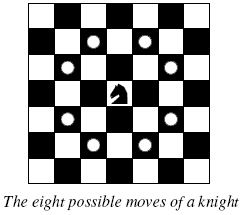转载自:https://blog.csdn.net/riba2534/article/details/54176523
题目:
A Knight's Journey
| Time Limit: 1000MS | Memory Limit: 65536K | |
| Total Submissions: 53183 | Accepted: 18072 |
Description
 Background
Background The knight is getting bored of seeing the same black and white squares again and again and has decided to make a journey
around the world. Whenever a knight moves, it is two squares in one direction and one square perpendicular to this. The world of a knight is the chessboard he is living on. Our knight lives on a chessboard that has a smaller area than a regular 8 * 8 board, but it is still rectangular. Can you help this adventurous knight to make travel plans?
Problem
Find a path such that the knight visits every square once. The knight can start and end on any square of the board.
Input
The input begins with a positive integer n in the first line. The following lines contain n test cases. Each test case consists of a single line with two positive integers p and q, such that 1 <= p * q <= 26. This represents a p * q chessboard, where p describes how many different square numbers 1, . . . , p exist, q describes how many different square letters exist. These are the first q letters of the Latin alphabet: A, . . .
Output
The output for every scenario begins with a line containing "Scenario #i:", where i is the number of the scenario starting at 1. Then print a single line containing the lexicographically first path that visits all squares of the chessboard with knight moves followed by an empty line. The path should be given on a single line by concatenating the names of the visited squares. Each square name consists of a capital letter followed by a number.
If no such path exist, you should output impossible on a single line.
If no such path exist, you should output impossible on a single line.
Sample Input
3 1 1 2 3 4 3
Sample Output
Scenario #1: A1 Scenario #2: impossible Scenario #3: A1B3C1A2B4C2A3B1C3A4B2C4
注意:因为要走完棋盘上所有格子,所以必定经过(1,1),所以可以直接从(1,1)开始dfs
1 #include <stdio.h> 2 #include <string.h> 3 #include <iostream> 4 #include <stack> 5 #include <queue> 6 #include <vector> 7 #include <cmath> 8 #include <algorithm> 9 #define mem(a,b) memset(a,b,sizeof(a)) 10 using namespace std; 11 int go[8][2]= {{-1,-2},{1,-2},{-2,-1},{2,-1},{-2,1},{2,1},{-1,2},{1,2}};//字典序方向 12 int vis[30][30]; 13 int n,m,flag; 14 struct node 15 { 16 int x,y; 17 } a[30]; //存储每一步的坐标 18 void dfs(int x,int y,int step) 19 { 20 a[step].x=x,a[step].y=y;//把当前路径存入结构体 21 if(step==n*m)//搜完每一个格子打印路径 22 { 23 for(int i=1; i<=step; i++) 24 printf("%c%d",a[i].y-1+'A',a[i].x);//打印路径 25 printf(" "); 26 flag=1; 27 } 28 if(flag)return; 29 for(int i=0; i<8; i++) 30 { 31 int xx=x+go[i][0]; 32 int yy=y+go[i][1]; 33 if(xx>0&&xx<=n&&yy>0&&yy<=m&&vis[xx][yy]==0)//判断是否越界 34 { 35 vis[xx][yy]=1;//搜过的标记 36 dfs(xx,yy,step+1); 37 vis[xx][yy]=0;//标记回来 38 } 39 } 40 } 41 int main() 42 { 43 int t,ci=1; 44 scanf("%d",&t); 45 while(t--) 46 { 47 mem(vis,0); 48 flag=0; 49 scanf("%d%d",&n,&m); 50 printf("Scenario #%d: ",ci++); 51 vis[1][1]=1;//先把第一个坐标标记了 52 dfs(1,1,1);//从(1,1)开始搜索 53 if(flag==0)printf("impossible "); 54 printf(" "); 55 } 56 return 0; 57 }